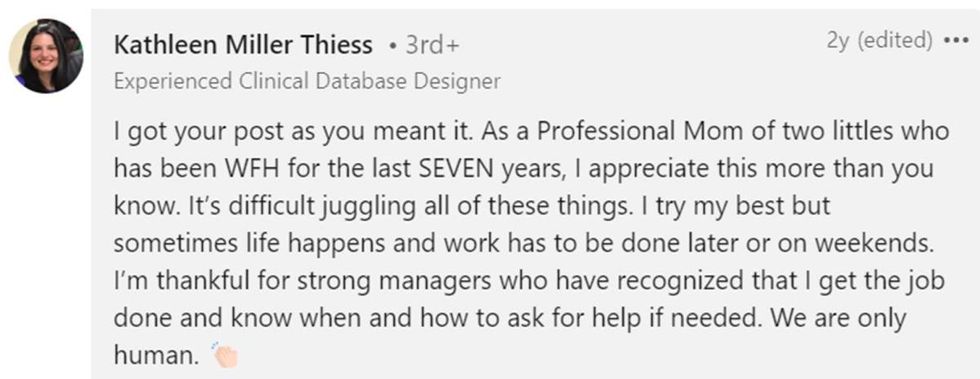A great manager is also a great leader, one who makes employees feel valued while motivating them to perform their best. Savvy managers understand the importance of comfort and flexibility in work hours. In 2020, as the COVID pandemic forced professionals to adapt to working from home, Megan Witherspoon emerged as an exemplary leader, showing deep care for her team. In a heartwarming LinkedIn post, she shared a list of things she "cared" and "did not care" about regarding her employees.

Witherspoon, the Vice President of Communications at Altria and a mother of two, began her post by stating she “doesn’t care” if employees go offline for an hour or two for a doctor’s appointment, but she “does care” if their child is sick. She “does care” if someone needs to care for an ailing mom, but she “doesn’t care” if they make up the time by working during meals or while administering medications.
“I DO care that a bus driver shortage means you don’t have reliable transportation for your son. I DO NOT care if you need to get back to me in an hour after picking him up from school,” she listed. She “does care” if an employee’s dog is puking all over their rug, but she “doesn’t care” if they need to jump off their call to rush him outside.
Adding to the list, she wrote, “I DO care that you desperately need to get out of your house because you’ve been cooped up far too long. I DO NOT care if you’d like to work from the office for a few days, or from Florida for a week,” plus, “I DO care that you haven’t taken your vacation time, because I know you need a break. I DO NOT care if that means asking for help so you can disconnect without missing a deadline.”

She wrapped up the post with a heartfelt message for her employees, which signified that she actually “cared” for her employees. “I DO care about YOU and the things you care about. I DO care that you deliver quality work and perform at your best. I DO NOT care when, where, or how you get your work done.” The post attracted the attention of more than 104,000 people, becoming viral with over 2200 comments and nearly 8000 reposts.



"I never expected my post to get this much attention—I've had a huge outpouring of support, both from inside my company and on LinkedIn. It's reaffirmed that this matters so much to so many people,” the 42-year-old told Newsweek, adding that the pandemic was a great motivator that prompted her to change. "The pandemic was a huge catalyst for change. Suddenly entire companies went fully remote overnight, and many are still working remotely 18 months later. We've now shown that it's possible to embrace flexibility and still be effective and that it holds benefits to both employer and employee.”
Speaking to Bored Panda, she said that “caring is critical.” For a long time before the pandemic, it was believed that the personal and professional lives were meant to be separate. But soon the trend whittled away into black-and-white conversations. In such a scenario, Witherspoon wanted to bring a shift in her workplace. “Now the personal and the professional are intertwined, and we’ve all felt the benefits of caring for our colleagues, we no longer need to divide ourselves in half when we log into our computers each day,” she pronounced. Witherspoon believes that the work-from-home model is a “win-win” situation for both businesses and their employees.


















 Revenge can feel easier than forgiveness, which often brings sadness or anxiety.
Revenge can feel easier than forgiveness, which often brings sadness or anxiety. 
 In the past two years, two malaria vaccines have become available for babies starting at 5 months of age.
In the past two years, two malaria vaccines have become available for babies starting at 5 months of age. By exploiting vulnerabilities in the malaria parasite’s defense system, researchers hope to develop a treatment that blocks the parasite from entering cells.
By exploiting vulnerabilities in the malaria parasite’s defense system, researchers hope to develop a treatment that blocks the parasite from entering cells. Created with
Created with 

 Volunteers who drive homeless people to shelters talk with a person from Ukraine in Berlin on Jan. 7, 2026.
Volunteers who drive homeless people to shelters talk with a person from Ukraine in Berlin on Jan. 7, 2026.
 Tasks that stretch your brain just beyond its comfort zone, such as knitting and crocheting, can improve cognitive abilities over your lifespan – and doing them in a group setting brings an additional bonus for overall health.
Tasks that stretch your brain just beyond its comfort zone, such as knitting and crocheting, can improve cognitive abilities over your lifespan – and doing them in a group setting brings an additional bonus for overall health. Overdoing any task, whether it be weight training or sitting at the computer for too long, can overtax the muscles as well as the brain.
Overdoing any task, whether it be weight training or sitting at the computer for too long, can overtax the muscles as well as the brain.

 Amoxicillin is a commonly prescribed broad-spectrum antibiotic.
Amoxicillin is a commonly prescribed broad-spectrum antibiotic.  Chart: The Conversation, CC-BY-ND
Chart: The Conversation, CC-BY-ND
 Counterintuitively, social media can make you feel more bored and lonely.
Counterintuitively, social media can make you feel more bored and lonely. Talking about what you’ve read can add a social dimension to what can be a solitary activity.
Talking about what you’ve read can add a social dimension to what can be a solitary activity.